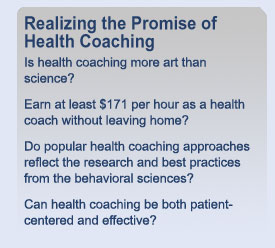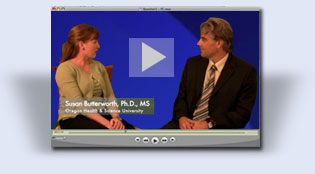 |
 Realizing The Promise of Health Coaching>> Realizing The Promise of Health Coaching>> |
Evidence-Based Health Coaching Video Series: Motivational Interviewing in Health Care
 How Can Motivational Interviewing be Applied in Health Care? How Can Motivational Interviewing be Applied in Health Care?
 What is Motivational Interviewing? What is Motivational Interviewing?
 Patient-Centered Care or “Worst Case Scenario”? Patient-Centered Care or “Worst Case Scenario”?
 How Can Organizations Build Evidence-Based Health Coaching Teams? How Can Organizations Build Evidence-Based Health Coaching Teams?
 What are the Guiding Principles of Motivational Interviewing? What are the Guiding Principles of Motivational Interviewing?
 What is the “Best Case Scenario” for What is the “Best Case Scenario” for
Patient-Centered Care?
|

Watch the first six installments of this ten-part video series on the future of health coaching
and brief Motivational Interviewing. |
 |
| |
Moving to an Evidence-Based Health Coaching Practice
 Various health coaching approaches are being used in employer, primary care, community, health plan and population health improvement settings to support individual lifestyle change, treatment adherence, and self-care. Yet while health coaching is a frequently used term, it is often a poorly defined, informal practice. Some clinicians refer to any patient education or advice-giving encounter as “health coaching.” And many nonclincian and clinician health coaches use a variety of life coaching approaches that are based more on popular psychology than behavioral science research. These facts raise a number of questions: What is coaching? Can coaching approaches from the business and sports worlds be applied by clinicians in health care settings? Which health coaching approaches are most effective? How can health coaching be patient-centered and deliver best value to patients and health care payers and purchasers? Various health coaching approaches are being used in employer, primary care, community, health plan and population health improvement settings to support individual lifestyle change, treatment adherence, and self-care. Yet while health coaching is a frequently used term, it is often a poorly defined, informal practice. Some clinicians refer to any patient education or advice-giving encounter as “health coaching.” And many nonclincian and clinician health coaches use a variety of life coaching approaches that are based more on popular psychology than behavioral science research. These facts raise a number of questions: What is coaching? Can coaching approaches from the business and sports worlds be applied by clinicians in health care settings? Which health coaching approaches are most effective? How can health coaching be patient-centered and deliver best value to patients and health care payers and purchasers?
What is “Coaching?”
The International Coach Federation (ICF) defines coaching as “partnering with clients in a thought-provoking and creative process that inspires them to maximize their personal and professional potential.”1 Life coaches help clients “clarify their mission, purpose and goals, and help them achieve that outcome.” Life coaching borrows from executive coaching methods that companies use to support employee career growth, learning and performance.
Continue reading Moving to an Evidence-Based Health Coaching Practice >>

Article 1: Realizing The Promise of Health Coaching
The Role of the Behavioral Sciences in Health Care
Health Coaching as an Evidence-Based Practice
Is “Usual” Health Coaching Evidence-Based?
Are Popular Health Coaching Training Programs Evidence-Based?
Putting Evidence-Based Health Coaching Into Practice
Article 2: Moving to an Evidence-Based Health Coaching Practice
What is “Coaching?”
Eleven Core Coaching Competencies
Applications & Limitations of Traditional Coaching Approaches in Health Care
Health Coaching Across the Population Health Improvement Continuum
Evidence-Based Health Coaching Models and Approaches
Health Coaching Roles and Proficiency
Preparing the Health Care Workforce for the New Health Care Environment
|
Evidence-Based Health Coaching
- An effective partnership-oriented approach to support patient health.
- Based on validated approaches and techniques such as motivational interviewing.
- A core competency for all clinicians; a specialty practice for population health improvement professionals.
- A skill set developed through advanced learning and competency development approaches.
- Not a “soft skill” or competency set “innate” to nurses or other clinicians.
- Not routinely used in usual health care, employer, disease management or care management settings.
- Not well-represented or reflected in popular health coaching training programs.
- A competency set that should be regularly assessed to assure fidelity to evidence-based practice standards.
|
 |










 Realizing The Promise of Health Coaching>>
Realizing The Promise of Health Coaching>>





